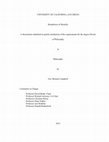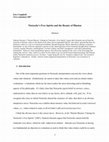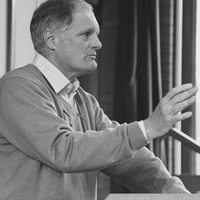Papers by Eric Campbell

Australasian Journal of Philosophy, 2020
Moral abolitionists argue that ordinary moral discourse has downsides substantial enough to warra... more Moral abolitionists argue that ordinary moral discourse has downsides substantial enough to warrant abandoning the discourse in favor of some replacement(s). Their most common critique is that the 'realist' character of moral discourse inhibits important forms of self-awareness. Until recently, metaethicists had operated on the assumption that abolitionism depends on error theory. To this day, there has been no discernible recognition that well-established metaethical views might strongly support abolitionism, despite rejecting error theory. Here I argue that expressivism supports abolitionism and fits very poorly with quasi-realism. That is because (1) the quasi-realist strategy for defeating error theory helps abolitionists by entailing that they have no need of error theory, (2) expressivist interpretations of belief in realism strongly support abolitionist critiques from self-awareness, and (3) there is an inherent instability between expressivism and quasirealism, while abolitionism and expressivism fit very nicely together.

Australasian Journal of Philosophy, 2021
Moral abolitionists argue that ordinary moral discourse has downsides substantial enough to warra... more Moral abolitionists argue that ordinary moral discourse has downsides substantial enough to warrant abandoning the discourse in favour of some replacement(s). Their most common critique is that the 'realist' character of moral discourse inhibits important forms of self-awareness. Until recently, metaethicists had operated on the assumption that abolitionism depends on error theory. To this day, there has been no discernible recognition that well-established metaethical views might strongly support abolitionism, despite rejecting error theory. Here I argue that expressivism supports abolitionism and fits very poorly with quasi-realism. That is because (1) the quasi-realist strategy for defeating error theory helps abolitionists by entailing that they have no need of error theory, (2) expressivist interpretations of belief in realism strongly support abolitionist critiques from self-awareness, and (3) there is an inherent instability between expressivism and quasi-realism, while abolitionism and expressivism fit very nicely together.
Constructivists aim to account for the semantics or metaphysics of (part or all of) normativity. ... more Constructivists aim to account for the semantics or metaphysics of (part or all of) normativity. Against realists, and along with expressivists and subjectivists, constructivists argue that there are no relevant normative facts or truths independent of the practical standpoint of some agent(s). Constructivists hold that normative reality or truth is "constructed" by means of a specified procedure or otherwise arises from agentsʼ deliberative activity or self-conception.

My dissertation has three main parts. In the first I develop a commitment model of moral judgment... more My dissertation has three main parts. In the first I develop a commitment model of moral judgment. I argue that moral judgments and the broader discourse in which they take place can be understood in terms of the operation of distinct but interacting commitment strategies. To a first approximation, these strategies operate at the levels of individual and social psychology, and biological and/or cultural evolution. All commitment strategies provide motivational stability by reducing one’s (perceived) flexibility of action. Some such strategies are undertaken deliberately, such as when an addict signs a contract forcing her to donate money to a despised organization if she is caught using.
However, the commitment strategies associated with moral judgments are rarely if ever conscious or deliberate. In fact, a central aspect of my commitment model holds that the peculiar motivational power of moral judgments is importantly connected to their power to deflect attention away from our actual motivations and values, and that this motivational strategy is undermined by an awareness of its workings. A primary goal of the first part is to explain (away) belief in intrinsic (nonrelational) value and practical reasons that are metaphysically independent of any person’s actual concerns.
The second part is the third chapter and provides a positive defense of a neo-Humean view of practical rationality according to which all practical reasons and values are relative to some actual concern(s). I defend this view against rationalist (anti-Humean) objections, and then disgnose a common source of confusion among some of the most prominent rationalist conceptions of practical reason, namely their reliance on an untenable near-identification of willpower with rationality. A particular strength of my account is that it naturally explains how this highly problematic claim could seem so obviously correct as not to require any real defense.
The final three chapters argue that moral discourse, due to its systematic deflection of attention from our motives, threatens to commit us in ways that are both radically at odds with our actual concerns and that motivate self-deception. As part of an an effort to better promote our (highest) values, I favor investigating and evaluating our actual values rather than our ostensible moral obligations.
Ethics, Apr 2014
I argue that moral judgments function as commitment strategies that rely on a deflection of atten... more I argue that moral judgments function as commitment strategies that rely on a deflection of attention from our motivations and values. Revealing the hidden workings of these strategies allows me to illustrate and explain some of the widely unrecognized practical downsides of moral discourse. I recommend a departure from moral discourse in favor of paying more and better attention to our actual concerns. Important strengths of my approach over contemporary forms of moral abolitionism lie in my ability to sidestep moral error theories, my acknowledgement of the significant value of moral discourse, and thus the restricted target of my recommendation.

Nadeem Hussain’s “Honest Illusion: Valuing for Nietzsche’s Free Spirits” argues that Nietzsche mo... more Nadeem Hussain’s “Honest Illusion: Valuing for Nietzsche’s Free Spirits” argues that Nietzsche moved from the rejection of intrinsic values to the denial of all values, but recommended that his ‘free spirits’ pretend that there are (intrinsic) values as a way to avoid practical nihilism. Bernard Reginster follows Hussain in offering ‘normative fictionalism’ as one of the two alternative answers to the central question of how Nietzsche thought about valuation. I closely examine Hussain’s and Reginster’s textual evidence and find it unsupportive and often undermining fictionalism. Moreover, their interpretation ignores what Nietzsche regarded as the value of the knowledge that nothing has intrinsic value, which is to allow his free spirits to go beyond the kind of phenomenology that Hussain claims Nietzsche wanted to preserve for them. I argue along the way for ‘normative subjectivism’, the second of Reginster’s alternatives. Finally, I sketch a better-supported interpretation of Nietzsche’s use of pretense in valuation.

Journal of Nietzsche Studies (2015)
Nadeem Hussain argues that Nietzsche’s rejection of intrinsic values led him to reject the existe... more Nadeem Hussain argues that Nietzsche’s rejection of intrinsic values led him to reject the existence of values generally, but that he wanted his “free spirits” to pretend to believe in (intrinsic) values as a way to avoid practical nihilism. I examine Hussain’s textual evidence and find it quite unsupportive of and sometimes even hostile to his fictionalist interpretaion. I argue that this interpretation ignores what Nietzsche regarded as the value of the knowledge that nothing has intrinsic value, which is to allow his free spirits to go beyond the kind of phenomenology that Hussain claims Nietzsche wanted to preserve for them. Recognizing this central aspect of Nietzsche’s project adds support to the much more natural subjectivist realist interpretation that Hussain rejects en route to his fictionalist interpretation. Finally, I sketch a better-supported interpretation of Nietzsche’s use of pretense in valuation.
Galileo's 'falling stones' thought-experiment is likely the most famous in the history of science... more Galileo's 'falling stones' thought-experiment is likely the most famous in the history of science. Many philosophers in the present day use it as the best example of what a thought-experiment is capable of adding to our epistemic arsenal, despite the enormous range of their answers to this question. I provide what I take to be the best analysis of the thought-experiment to date. On my analysis, it has more in common with a magic-trick than an experiment, and is to that extent epistemically valueless. I draw no larger conclusions about the value of thought-experiments broadly.
Teaching Documents by Eric Campbell
Current and Future Research by Eric Campbell











Uploads
Papers by Eric Campbell
However, the commitment strategies associated with moral judgments are rarely if ever conscious or deliberate. In fact, a central aspect of my commitment model holds that the peculiar motivational power of moral judgments is importantly connected to their power to deflect attention away from our actual motivations and values, and that this motivational strategy is undermined by an awareness of its workings. A primary goal of the first part is to explain (away) belief in intrinsic (nonrelational) value and practical reasons that are metaphysically independent of any person’s actual concerns.
The second part is the third chapter and provides a positive defense of a neo-Humean view of practical rationality according to which all practical reasons and values are relative to some actual concern(s). I defend this view against rationalist (anti-Humean) objections, and then disgnose a common source of confusion among some of the most prominent rationalist conceptions of practical reason, namely their reliance on an untenable near-identification of willpower with rationality. A particular strength of my account is that it naturally explains how this highly problematic claim could seem so obviously correct as not to require any real defense.
The final three chapters argue that moral discourse, due to its systematic deflection of attention from our motives, threatens to commit us in ways that are both radically at odds with our actual concerns and that motivate self-deception. As part of an an effort to better promote our (highest) values, I favor investigating and evaluating our actual values rather than our ostensible moral obligations.
Teaching Documents by Eric Campbell
Current and Future Research by Eric Campbell
However, the commitment strategies associated with moral judgments are rarely if ever conscious or deliberate. In fact, a central aspect of my commitment model holds that the peculiar motivational power of moral judgments is importantly connected to their power to deflect attention away from our actual motivations and values, and that this motivational strategy is undermined by an awareness of its workings. A primary goal of the first part is to explain (away) belief in intrinsic (nonrelational) value and practical reasons that are metaphysically independent of any person’s actual concerns.
The second part is the third chapter and provides a positive defense of a neo-Humean view of practical rationality according to which all practical reasons and values are relative to some actual concern(s). I defend this view against rationalist (anti-Humean) objections, and then disgnose a common source of confusion among some of the most prominent rationalist conceptions of practical reason, namely their reliance on an untenable near-identification of willpower with rationality. A particular strength of my account is that it naturally explains how this highly problematic claim could seem so obviously correct as not to require any real defense.
The final three chapters argue that moral discourse, due to its systematic deflection of attention from our motives, threatens to commit us in ways that are both radically at odds with our actual concerns and that motivate self-deception. As part of an an effort to better promote our (highest) values, I favor investigating and evaluating our actual values rather than our ostensible moral obligations.